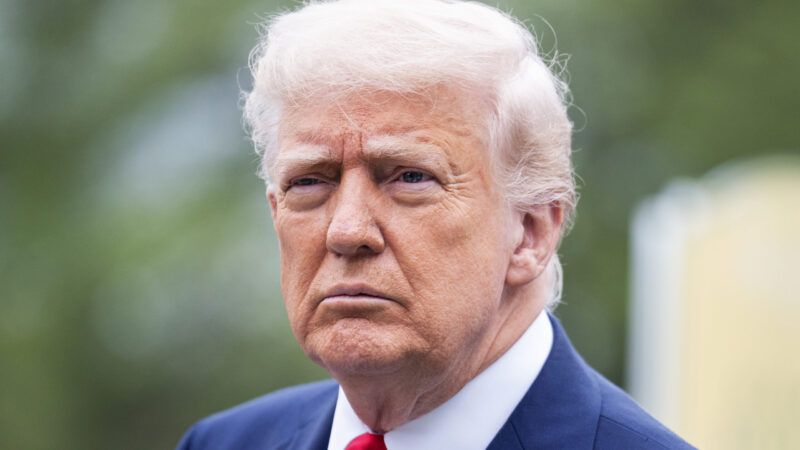Trump's Actions Contradict His Avowed Commitment to First Amendment Rights
The president has launched a multifaceted crusade against speech that offends him.

On the first day of his second term, President Donald Trump signed an executive order aimed at "restoring freedom of speech." But judging from his administration's policies and his actions as a private litigant, Trump's commitment to that principle is highly selective at best.
Last week, Secretary of State Marco Rubio announced that he was "taking a crucial step toward keeping the president's promise to liberate American speech" by ending his department's misbegotten crusade against online "disinformation." This was a welcome development, since that amorphous mission had become an excuse for suppressing constitutionally protected speech.
Still, Rubio's ringing defense of First Amendment rights is hard to reconcile with his determination to expel foreign students, including legal permanent residents, whose opinions he unilaterally deems contrary to U.S. foreign policy interests. Although Rubio and Trump seem to think the First Amendment applies only to American citizens, the U.S. Supreme Court disagrees.
Another Trump appointee, Federal Communications Commission Chairman Brendan Carr, likewise pays lip service to free speech while working to undermine it. Carr, like Federal Trade Commission Chairman Andrew Ferguson, seems bent on overriding the editorial choices of social media companies in the name of fairness and balance—a form of meddling that the Supreme Court has recognized as a threat to First Amendment rights.
Carr also aspires to police journalism, including the editing of a 60 Minutes interview with Kamala Harris, which he thinks is a legitimate subject of regulatory review. Trump himself argues that CBS News committed consumer fraud under Texas law by making Harris seem less "CRAZY" and "DUMB," which he risibly claims caused him "at least" $10 billion in damages.
Trump is pursuing a similar lawsuit against The Des Moines Register and pollster Ann Selzer. He claims they violated the Iowa Consumer Fraud Act by reporting the results of a pre-election poll that erroneously gave Harris a three-point lead in that state.
It is hard to overstate the threat that carving out a "fake news" exception to the First Amendment would pose to freedom of the press. If Trump had his way, journalists would be exposed to daunting legal expenses and potentially ruinous civil liability whenever their reporting was arguably misleading or inaccurate.
Trump's hostility to freedom of the press is also apparent in his frivolous defamation lawsuits, his threats of regulatory retaliation against broadcasters, and his ridiculous dispute with the Associated Press, which he sought to exclude from the White House because it did not fully embrace his new name for the body of water between the United States and Mexico. "If the Government opens its doors to some journalists," a federal judge ruled in that last case, "it cannot then shut those doors to other journalists because of their viewpoints."
Trump likewise engaged in viewpoint discrimination, which is presumptively unconstitutional, when he issued executive orders targeting law firms that have represented clients or causes he does not like. Lawyers at those firms, he decreed, would lose their security clearances, government contracts, and access to federal buildings.
Trump also has targeted leading American universities, which he portrays as hotbeds of antisemitism and ideological indoctrination. While conservatives may be sympathetic to that critique, schools like Harvard plausibly argue that Trump's attempts to impose his preferred reforms by threatening to withhold federal funding amount to "unconstitutional conditions," requiring the surrender of First Amendment rights in exchange for a government benefit.
Trump's attack on "diversity, equity, and inclusion" (DEI) programs also extends into the private sector. He has threatened businesses with "civil compliance investigations" aimed at rooting out "DEI discrimination," a nebulous concept that is apt to have a chilling impact on employee training that promotes ideas the president considers "immoral."
Rubio avers that Trump is determined to oppose "the weaponization of America's own government to silence, censor, and suppress the free speech of ordinary Americans." Yet that seems like an apt description of the president's multifaceted crusade against speech that offends him.
© Copyright 2025 by Creators Syndicate Inc.
